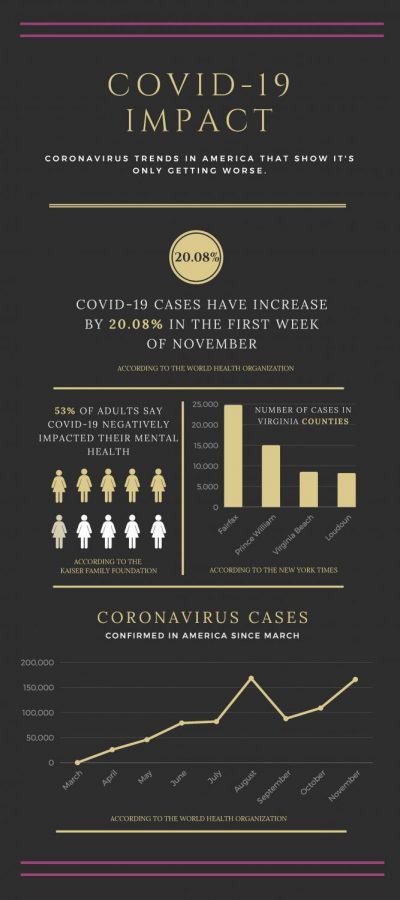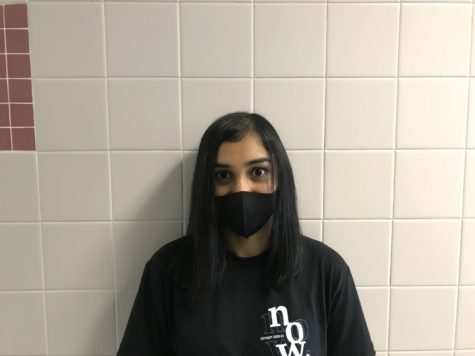People dangerously desensitized to COVID-19
This infographic shows the impact of COVID-19. Source: World Health Organization
December 3, 2020
The world was sent into a collective adrenaline rush after the emergence of the coronavirus earlier this year. The mixture of fear and uncertainty in the face of a deadly and extremely contagious virus had unified the public in their determination to protect themselves and fight against the common threat. Over ten months later, that spirit seems to have all but dissipated.
“When I first heard that schools would be closing in March, I myself did not downplay it, but I never really anticipated the immense impact it would have on me,” junior Mrudula Rapaka said. “Now, especially seeing how normalized it’s become in media and pop culture, it frustrates me knowing that if the virus won’t be taken seriously, thousands of lives will continue to be taken away.”
In Virginia, a stay-at-home order was enacted on March 13. Schools and offices shut down so abruptly that most people didn’t have the chance to pack up their desks or clear out their lockers. When the decision was made to enforce a quarantine, the number of new COVID-19 cases each day ranged from 730 to 946 cases, according to the New York Times. Virginia’s cases have only escalated since that time, now averaging from 1,000 to 2,000 per day.
Even without an approved vaccine, the nation is reopening. For many, the pressure for life to return to normal surpasses the danger in doing so. Since August, many schools nationwide resumed in-person learning to provide a better education than could be afforded virtually, as well as with free food, a clinic and mental health counseling.
“What COVID-19 has done is highlight the fact that public education is not just in the classroom,” psychology teacher Jessica Bibb said. “We as a school system are really a central service provider for our students and our community.”
Many people have also begun to overlook the severity of the virus, as a result of desensitization to COVID-19 related news. When the virus first came to light, it seemed that every new case and statistic delivered a shock. Now, the number of cases has become so overwhelming that many minds have been numbed to the devastation it has caused. As the coronavirus becomes a more regular part of life, it is easier to minimize the gravity of the situation.
“This summer, a family member of mine did pass away from the virus, so it is very frustrating to see people downplay it,” Rapaka said. “I think one of the main reasons people have been desensitized to news relating to the virus is the normalization of jokes around it. When we start to make all these ‘funny’ jokes about the virus, we eventually come to accept it as normal, which is very damaging to people’s responses.”
As the virus becomes an increasingly common part of life, many have begun to view the virus as nothing more than an inconvenience. This is in large part due to the stress of staying quarantined during many events that would usually warrant social interaction or congregation, such as the arrival of the holiday season.
According to the Kaiser Family Foundation, 53% of adults say that the coronavirus has negatively impacted their mental health. With the arrival of the holiday season, those who were quick to lock their doors and forsake social interaction earlier this year are now making every exception to try and conduct their life as normally as possible.
This desensitization could be detrimental to public safety. Only if people acknowledge the devastation caused by the virus will they understand the need to wear masks and avoid large social gatherings. According to the Infectious Disease Special Edition, up to 770 thousand lives could be saved by following these safety guidelines. If people don’t continue to follow these guidelines, super-spreader events will be created that undermine efforts to move forward and protect society.
“I think right now people are frustrated and are really struggling with the reality of COVID-19,” Bibb said. “Initially, the thought process was that we would be locked down for a few weeks, and then we could continue on, but of course that didn’t happen. I think the collective stress response is having a long-term impact and we’re all anxious about what’s going to happen.”





